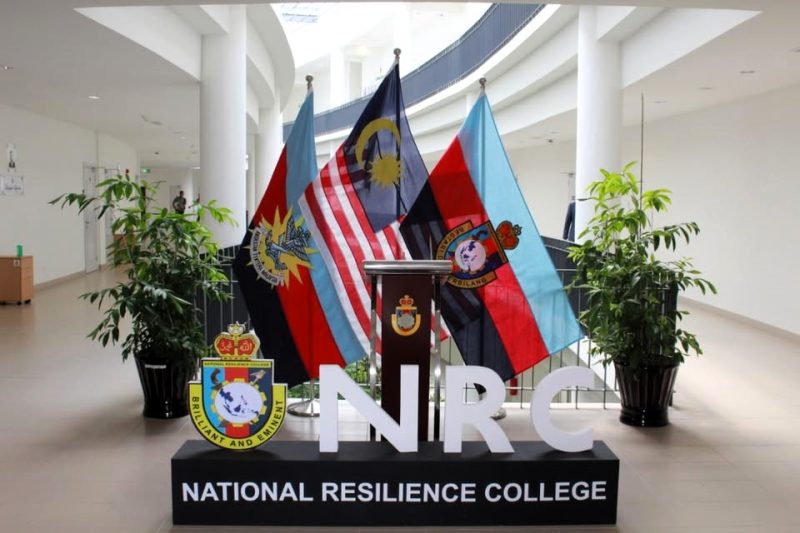National Resilience College: Nurturing strategic thinkers as the catalyst of change for Malaysia's future
3 天前
At the heart of Malaysia’s strategic nerve centre in Putrajaya, the National Resilience College (NRC) is quietly shaping leaders who think beyond politics, beyond silos, and beyond the present. Its slogan is bold: “Nurturing Strategic Thinkers As The Catalyst Of Change”, and its impact is already being felt in national security, crisis management, and policy innovation.
When we speak of national resilience, many imagine military readiness, economic growth, or disaster response. These are crucial pillars, but resilience is equally about foresight, the ability to anticipate change, adapt, and turn challenges into opportunities. This is precisely the realm of the NRC, Malaysia’s highest-level strategic learning institution under the National Centre for Defence Studies (PUSPAHANAS).
Established in 2019, the NRC serves as the capstone of strategic education for senior military officers of Brigadier General and Colonel rank, senior civil servants, and other decision-makers entrusted with the nation’s long-term interests. Its purpose is not to teach routine management, theories, or technical skills but to cultivate statesman-quality leaders who can harness all instruments of national power – diplomatic, informational, military, and economic (DIME), including political, societal, and environmental – to advance Malaysia’s security, stability, and prosperity.
At the heart of the NRC’s work is its 52-week National Resilience Course, a rigorous programme that combines academic depth with practical experience. The course is structured into four semesters. Semester one is about State, Society and National Power, where course members analyse governance systems, economic drivers, strategic leadership, and foreign policy. In the second semester, they explore International and Security Studies to understand security challenges in Asean and the wider global environment.
The third semester focuses on National Security Studies, providing a comprehensive, policy-focused understanding of non-military security threats and growing security issues that governments face across multiple dimensions. In the final semester, participants apply their learning to craft a strategic policy paper on a real national issue, integrating political, economic, defence, and societal dimensions. The paper is then formally presented to the relevant government ministries, providing actionable recommendations and sharpening participants’ ability to influence policy at the highest level.
More than a traditional academic programme, the course fosters cross-sector collaboration, ensuring participants understand not just their institutional roles but also how to integrate efforts across ministries, agencies, private sectors, and NGOs.
While the NRC already attracts senior leaders from defence, selected government bodies, and foreign military officers, there is a pressing need for high-level officers from all government agencies, especially those in economic planning, foreign affairs, internal security, finance, infrastructure, education, and technology, to join its programmes.
Such participation will help these leaders gain a deeper understanding of their shared responsibility in safeguarding Malaysia’s sovereignty, defence, and security. This aligns with the Whole of Government and Whole of Society (WoGoS) approach, where national resilience is built through collective awareness, shared expertise, and coordinated action across all sectors.
By engaging a broader spectrum of agencies, the NRC can strengthen Malaysia’s strategic unity, ensuring that every arm of government, not just the security sector, is capable of contributing to national defence and resilience.
The NRC’s value is not theoretical. In 2020, as Covid-19 gripped the nation, its participants worked with the National Security Council (MKN) and 22 government agencies to develop the Joint Common Operating Picture (J-COP). This live, integrated data system guided high-level crisis decisions in real time.
This was a milestone in Malaysia’s pandemic response. By integrating data from multiple sources into a single operating picture, decision makers could coordinate actions more effectively, avoid duplication, and respond to fast-changing developments. The project’s insights were later compiled into “Nation Call,” a strategic publication launched during the course closing ceremony, ensuring lessons learned could be applied in future crises.
The NRC has emerged as a hub for strategic discourse. In the past few years, it has hosted high-level roundtables on the whole-of-society approach to resilience, including the role of strategic media communication. Panels on Malaysia’s Middle Power Status and Public Diplomacy explore how Malaysia can enhance its influence in global affairs. It has also hosted formal keynote addresses from senior defence leaders, such as the chief of defence force and services chiefs, on evolving security challenges, as well as ambassadorial talks featuring foreign envoys, offering global perspectives on diplomacy, defence, and development. These are not ceremonial events. They are working forums where ideas are stress-tested, diverse viewpoints are considered, and strategies are sharpened for practical application.
Malaysia’s geopolitical and domestic challenges require leaders who can see beyond their portfolios. Economic competition in the region is intensifying, global power balances are shifting, and non-traditional threats from cyber warfare to climate change are becoming more urgent.
In this environment, leaders must be more than administrators. They must be strategic thinkers who can anticipate scenarios, integrate resources, and make decisive moves. This is the essence of the NRC’s mission – to develop leaders who are adaptable, insightful, and capable of leading change.
Graduates leave the NRC with sharper analytical skills, a broader worldview, and the ability to bridge divides. They embody the college’s aspiration to be both brilliant and eminent in thought leadership and national service – skills essential in a world where uncertainty is constant. They are trained not only to understand strategy but to implement it effectively, earning the title of policy entrepreneurs. These leaders can influence policy outcomes through both intellectual and practical expertise.
The NRC is more than a training institution. It is a strategic asset for Malaysia and an incubator for the kind of leadership that can navigate complexity, foster unity, and seize opportunities in a competitive world. Its work directly supports Malaysia’s national security and foreign policy goals, while also enhancing the country’s capacity for resilience across all sectors.
To maintain and expand this role, not only the Malaysian Armed Forces but also Malaysia in general must ensure sustained institutional support with adequate resources, expert faculty, and an updated curriculum reflecting emerging global trends. High-calibre participant selection will bring in the most capable and promising leaders from all government agencies, not just the defence sector. Post-Graduation Integration (PGI) will place NRC alumni in positions where they can apply their skills and influence national policy effectively.
In an era where challenges are interconnected – from economic shocks to pandemics and security threats – institutions like the NRC are critical. They ensure that Malaysia is prepared not only for the crises we can predict, but also for those we cannot yet foresee.
The NRC’s mantra, “Nurturing Strategic Thinkers As The Catalyst Of Change,” is not just a slogan – it is a commitment to shaping the leaders who will guide Malaysia through the uncertainties of the 21st century.
If Malaysia is to thrive in the next decade, not just survive, the NRC must be recognised, supported, and expanded. By bringing in high-level officers from across all government agencies and embedding the WoGoS approach into every cohort, the NRC can ensure that safeguarding the nation’s sovereignty, defence, and security is truly a shared national mission.
Colonel Mohd Haryzal Ismail is a member of the Malaysian Army and is attending the National Resilience College, PUSPAHANAS, Putrajaya.
The views expressed here are the personal opinion of the writer and do not necessarily represent that of Twentytwo13.
...Read the fullstory
It's better on the More. News app
✅ It’s fast
✅ It’s easy to use
✅ It’s free








